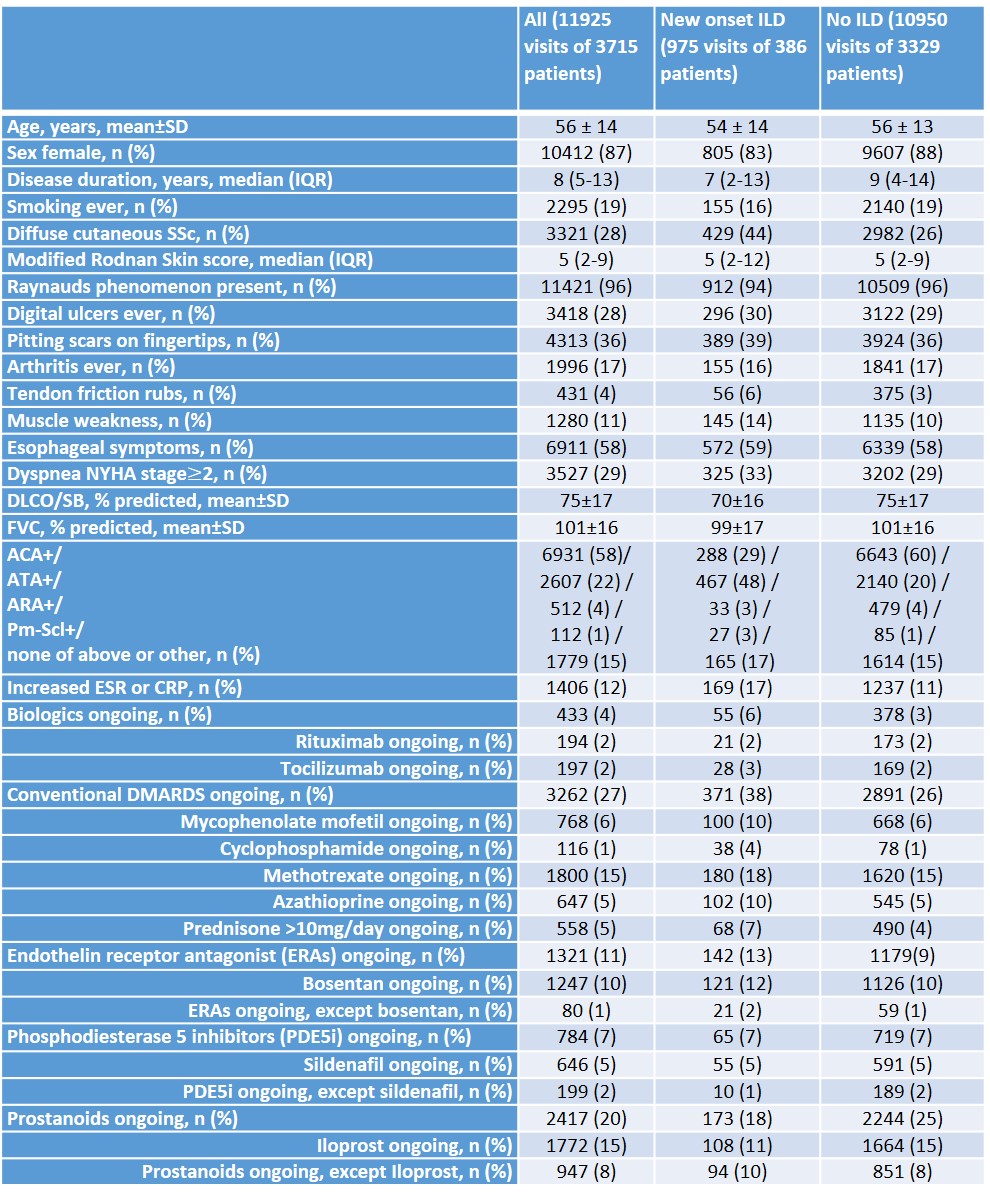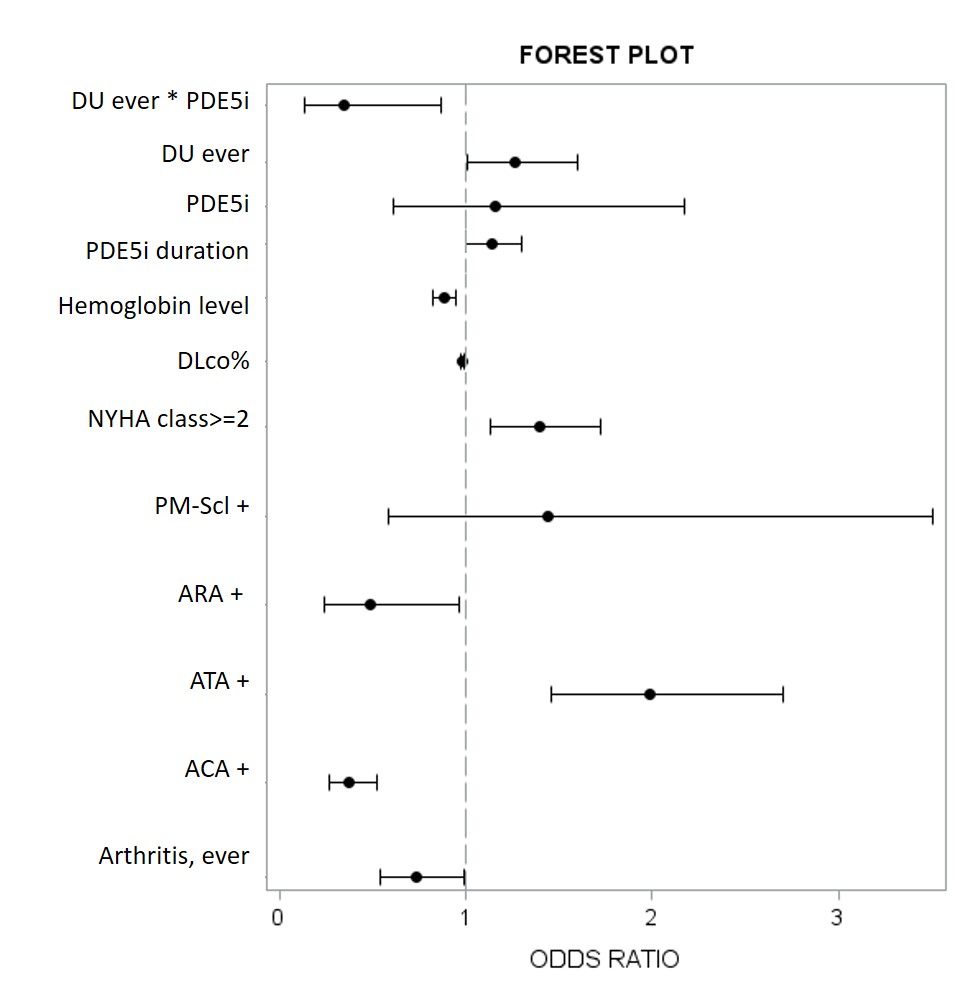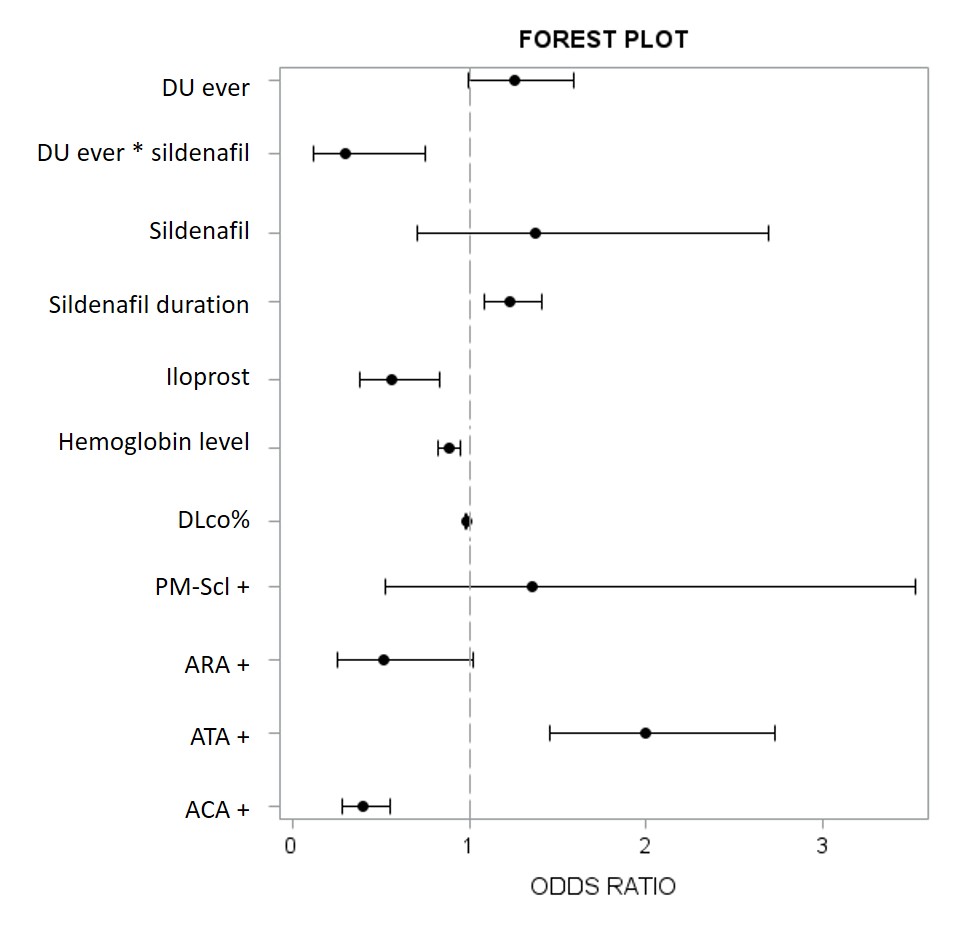Session Information
Session Type: Poster Session A
Session Time: 10:30AM-12:30PM
Background/Purpose: Inflammation and vasculopathy may play a role in the development of interstitial lung disease (ILD) in systemic sclerosis (SSc). Pre-clinical evidence showed possible preventive effects of vasoactive/vasodilating drugs (VVDs). Similarly, preliminary data from registries showed a preventive role of some immunosuppressants (IMS). As SSc patients regularly receive such medications to treat other disease manifestations, we aimed to evaluate the association between IMS/VVDs use and the development of SSc-ILD.
Methods: Patients from the EUSTAR database were eligible if classified according to the 2013 ACR/EULAR criteria for SSc, with baseline absence of ILD (defined by HRCT negative for lung abnormalities and FVC >70%), at least 1 follow-up CT available at 12±3 months, and information on IMS/VVDs exposure. Patients with pulmonary hypertension on RHC were excluded.
Exposure included the use of any IMS (mycophenolate mofetil, cyclophosphamide, azathioprine, methotrexate, prednisone over 10 mg/day – as conventional IMS; rituximab or tocilizumab – as biologic IMS) or any VVDs (bosentan, other endothelin receptor antagonists – ERAs, sildenafil, other phosphodiesterase 5 inhibitor – PDE5i, iloprost, other prostanoids) for at least 3 months.
New ILD onset on CT scan at 1-year follow-up represented our outcome. Associations with IMS/VVDs treatment were calculated using a generalized estimated equation model with backward selection, balancing for multiple visits of the same patients. Confounders included risk factors for ILD onset and possible reasons for IMS/VVDs prescription.
Results: Among 11925 yearly visits of 3715 SSc patients over a median 4 (95% CI 2-7) years follow up, ILD onset was detected in 386 follow-ups (10% of patients, 3% visits; Table 1).
Analyzing the preventive effectiveness according to drug classes (conventional/biologic IMS, ERAs, PDE5i, prostanoids), most clinical risk factors were confirmed (Figure 1), in particular DU (history or presence) significantly associated with ILD development (adjusted OR 1.26; 95% CI 1.01-1.60). PDE5i was the only class of drug associated with ILD onset. This did not emerge for the PDE5i class in general, but only when present in combination with DU (OR 0.35; 95% CI 0.14-0.87). The risk of ILD onset was not significantly associated with exposure to other VVDs classes or IMS.
When testing single medications (Figure 2), we still observed a higher risk of ILD onset for DU and an association of sildenafil with ILD onset. Again, this association turned significant for exposure to sildenafil exclusively in combination with DU (OR 0.30; 95% CI 0.12-0.75), suggesting a protective effect. Although the class of prostanoids did not associate with the outcome in the previous model, iloprost was associated with a reduced risk of ILD onset (OR 0.57; 95% CI 0.38-0.83) and this was regardless of DU.
Conclusion: We show that treatment with vasoactive/vasodilating drugs, specifically sildenafil and iloprost, but not with immunosuppressants, might have a protective effect on the development of SSc-ILD over 1-year, particularly in patients with DU. The preventive effect of these medications needs confirmation in randomized controlled trials.
To cite this abstract in AMA style:
Petelytska L, Tofani L, Siegert E, Zanatta E, Moroncini G, Bergmann C, smith v, Riemekasten G, Solanki K, Cacciapaglia F, Maurer B, da Silva J, Geroldinger-Simić M, Rodrigues A, Vonk M, de Vries-Bouwstra J, Hoffmann-Vold A, Distler O, Bruni C. Can Immunosuppression or Vasodilation Prevent the Onset of Interstitial Lung Disease in Systemic Sclerosis? An Association Analysis from the EUSTAR Database [abstract]. Arthritis Rheumatol. 2024; 76 (suppl 9). https://acrabstracts.org/abstract/can-immunosuppression-or-vasodilation-prevent-the-onset-of-interstitial-lung-disease-in-systemic-sclerosis-an-association-analysis-from-the-eustar-database/. Accessed .« Back to ACR Convergence 2024
ACR Meeting Abstracts - https://acrabstracts.org/abstract/can-immunosuppression-or-vasodilation-prevent-the-onset-of-interstitial-lung-disease-in-systemic-sclerosis-an-association-analysis-from-the-eustar-database/



